- Home
- Gerald Durrell
The Corfu Trilogy Page 7
The Corfu Trilogy Read online
Page 7
Suddenly I had an idea. Just over the hill lived Yani, the old shepherd, and his wife, in a minute, sparkling white cottage. Yani, I knew, had his siesta in front of his house, in the shade of his grapevine, and if I made enough noise approaching the house he would wake up. Once awake, it was certain that he would offer me hospitality. There was not a single peasant house you could visit and come empty away. Cheered by this thought, I set off up the stony, meandering pathway created by the pattering hooves of Yani’s goats, over the brow of the hill and into the valley, where the red roof of the shepherd’s house gleamed among the giant olive trunks. When I judged I was close enough, I stopped and threw a stone for Roger to retrieve. This was one of Roger’s favourite pastimes, but once having started it you had to continue, or else he would stand in front of you and bark hideously until you repeated the performance in sheer desperation. He retrieved the stone, dropped it at my feet, and backed away expectantly, ears cocked, eyes gleaming, muscles taut and ready for action. I ignored both him and the stone. He looked faintly surprised; he examined the stone carefully, and then looked at me again. I whistled a short tune and looked up into the sky. Roger gave an experimental yap; then, seeing I still took no notice, he followed it up with a volley of deep, rich barks that echoed among the olives. I let him bark for about five minutes. By this time I felt sure Yani must be aware of our arrival. Then I threw the stone for Roger, and, as he fled after it joyfully, I made my way round to the front of the house.
The old shepherd, as I expected, was in the tattered shade of the vine that sprawled on its iron trellis-work above my head, but to my intense annoyance he had not woken up. He was sprawling in a plain deal chair, which was tilted back against the wall at a dangerous angle. His arms dangled limply, his legs were spread out, and his magnificent moustache, orange and white with nicotine and age, lifted and trembled with his snores, like some strange seaweed that is raised and lowered by a gentle swell. The thick fingers of his stumpy hands twitched as he slept, and I could see the thick-ribbed yellow nails, like flakes cut from a tallow candle. His brown face, wrinkled and furrowed as the bark of a pine, was expressionless, the eyes tightly shut. I stared at him, trying to will him to wake up, but with no result. It was not etiquette for me to wake him, and I was debating whether it would be worth while waiting until he awoke naturally, or whether it would be better to go and be bored by Leonora, when Roger came in search of me, bustling round the side of the house, ears pricked, tongue drooping. He saw me, wagged his tail in brief greeting, and glanced round with the air of a visitor who knows he is welcome. Suddenly he froze, his moustache bristled, and he started to walk forward slowly, stiff-legged and quivering. He had seen something that I had failed to observe: curled up under Yani’s tilted chair sat a large, lanky grey cat, who was watching us with insolent green eyes. Before I could reach out and grab him, Roger had pounced. The cat, in a lithe movement that argued long practice, fled like a skimming stone to where the gnarled grapevine twisted drunkenly round the trellis, and shot up it with a scutter of sharp claws. Crouched among the bunches of white grapes, she stared down at Roger and spat delicately. Roger, frustrated and angry, threw back his head and barked threats and insults. Yani’s eyes flew open, his chair rocked, and his arms flailed violently in an effort to keep his balance. The chair teetered uncertainly and then settled onto all four legs with a thud.
‘Saint Spiridion save me!’ he implored loudly. ‘God have mercy!’
He glared round, his moustache quivering, to find the cause of the uproar, and saw me sitting demurely on the wall. I greeted him sweetly and politely, as though nothing had happened, and asked if he had slept well. He rose to his feet, grinning, and scratched his stomach vigorously.
‘Ah, it’s you making enough noise to split my head. Your health, your health. Sit down, little lord,’ he said, dusting off his chair and placing it for me; ‘it is good to see you. You will eat with me, and have a drink, perhaps? It is a very hot afternoon, very hot – hot enough to melt a bottle.’
He stretched and, yawning loudly, displayed gums as innocent of teeth as a baby’s. Then, turning towards the house, he roared:
‘Aphrodite… A phrodite… wake, woman… foreigners have come… the little lord is sitting with me… Bring food… d’you hear?’
‘I heard, I heard,’ came a muffled voice from behind the shutters.
Yani grunted, wiped his moustache, and made his way to the nearest olive tree and retired discreetly behind it. He reappeared, doing up his trousers and yawning, and came over to sit on the wall near me.
‘Today I should have taken my goats to Gastouri. But it was too hot, much too hot. In the hills the rocks will be so hot you could light a cigarette from them. So I went instead and tasted Taki’s new white wine. Spiridion! What a wine… like the blood of a dragon and as smooth as a fish… What a wine! When I came back the air was full of sleep, so here I am.’
He sighed deeply but impenitently, and fumbled in his pocket for his battered tin of tobacco and thin grey cigarette papers. His brown, calloused hand cupped to catch the little pile of golden leaf, and the fingers of his other hand tugged and pulled at it gently. He rolled the cigarette swiftly, nipped off the tobacco that dangled from the ends and replaced it in the tin, and then lit his smoke with the aid of a huge tin lighter from which a wick curled like an angry snake. He puffed reflectively for a moment, pulled a shred of tobacco off his moustache, and reached into his pocket again.
‘Here, you are interested in the little ones of God; look at this that I caught this morning, crouching under a rock like the devil,’ he said, pulling from his pocket a tiny bottle, firmly corked and filled with golden olive oil. ‘A fine one this, a fighter. The only fighter I know who can do damage with his backside.’
The bottle, filled to the brim with oil, looked as though it were made of pale amber, and enshrined in the centre, held suspended by the thickness of the oil, was a small chocolate-brown scorpion, his tail curved like a scimitar over his back. He was quite dead, suffocated by the glutinous grave. Around his corpse was a faint wisp of discoloration, like a mist in the golden oil.
‘See that?’ said Yani. ‘That’s the poison. He was full, that one.’
I asked, curiously, why it was necessary to put the scorpion in oil.
Yani chuckled richly, and wiped his moustache.
‘You do not know, little lord, though you spend all your time on your stomach catching these things, eh?’ he said, greatly amused. ‘Well, I will tell you. You never know, it may be of use to you. First catch the scorpion, catch him alive and catch him as gently as a falling feather. Then you put him, alive – mark you, alive – in a bottle of oil. Let him simmer, let him die in it, let the sweet oil soak up the poison. Then, should you ever be stung by one of his brothers (and Saint Spiridion protect you from that), you must rub the place with that oil. That will cure the sting for you so that it is of no more discomfort than the prick of a thorn.’
While I digested this curious information, Aphrodite appeared from the house, her wrinkled face as red as a pomegranate seed, bearing a tin tray on which was a bottle of wine, a jug of water, and a plate with bread, olives, and figs on it. Yani and I drank the wine, watered to a delicate pale pink, and ate the food in silence. In spite of his toothless gums, Yani tore large pieces of the bread off and champed them hungrily, swallowing great lumps that made his wrinkled throat swell. When we had finished, he sat back, wiped his moustache carefully, and took up the conversation again, as if there had been no pause.
‘I knew a man once, a shepherd like myself, who had been to a fiesta in a distant village. On the way back, as his stomach was warm with wine, he decided to have a sleep, so he found a spot beneath some myrtles. But while he slept a scorpion crept out from under the leaves and crawled into his ear, and when he awoke it stung him.’
Yani paused at this psychological moment to spit over the wall and roll himself another cigarette.
‘Yes,’ he sighed at last, ‘it was ve
ry sad… one so young. The tiny scorpion stung him in the ear… phut!… like that. The poor fellow flung himself about in his agony. He ran screaming through the olives, tearing at his head… Ah! it was dreadful. There was no one to hear his cries and help him… no one at all. In terrible pain he started to run for the village, but he never reached it. He fell down dead, down there in the valley, not far from the road. We found him the next morning when we were going to the fields. What a sight! What a sight! With that one little bite his head had swollen up as though his brains were pregnant, and he was dead, quite dead.’
Yani sighed deeply and lugubriously, twirling the little bottle of oil in his fingers.
‘That is why,’ he went on, ‘I never go up into the hills and sleep. And, in case I should perhaps share some wine with a friend and forget the danger, I always carry a scorpion bottle with me.’
The talk drifted to other and equally absorbing topics, and after an hour or so I rose, dusted the crumbs off my lap, thanked the old man and his wife for their hospitality, accepted a bunch of grapes as a parting present, and set off towards home. Roger walked close to me, his eyes fixed on my pocket, for he had noticed the grapes. At length, finding an olive grove, dark and cool with the long shadows of evening, we sat down by a mossy bank and shared the fruit. Roger ate his whole, pips and all. I spat out my pips into a circle around me, and imagined with satisfaction the flourishing vineyard that would grow up on the spot. When the grapes were finished I rolled over onto my stomach and, with my chin in my hands, examined the bank behind me.
A tiny green grasshopper with a long, melancholy face sat twitching his hind legs nervously. A fragile snail sat on a moss sprig, meditating and waiting for the evening dew. A plump scarlet mite, the size of a match-head, struggled like a tubby huntsman through the forest of moss. It was a microscopic world, full of fascinating life. As I watched the mite making his slow progress I noticed a curious thing. Here and there on the green plush surface of the moss were scattered faint circular marks, each the size of a shilling. So faint were they that it was only from certain angles they were noticeable at all. They reminded me of a full moon seen behind thick clouds, a faint circle that seemed to shift and change. I wondered idly what could have made them. They were too irregular, too scattered to be the prints of some beast, and what was it that would walk up an almost vertical bank in such a haphazard manner? Besides, they were not like imprints. I prodded the edge of one of these circles with a piece of grass. It remained unmoved. I began to think the mark was caused by some curious way in which the moss grew. I probed again, more vigorously, and suddenly my stomach gave a clutch of tremendous excitement. It was as though my grass-stalk had found a hidden spring, for the whole circle lifted up like a trapdoor. As I stared, I saw to my amazement that it was in fact a trapdoor, lined with silk, and with a neatly bevelled edge that fitted snugly into the mouth of the silk-lined shaft it concealed. The edge of the door was fastened to the lip of the tunnel by a small flap of silk that acted as a hinge. I gazed at this magnificent piece of workmanship and wondered what on earth could have made it. Peering down the silken tunnel, I could see nothing; I poked my grass-stalk down, but there was no response. For a long time I sat staring at this fantastic home, tryìng to decide what sort of beast had made it. I thought that it might be a wasp of some sort, but had never heard of a wasp that fitted its nest with secret doors. I felt that I must get to the bottom of this problem immediately. I would go down and ask George if he knew what this mysterious beast was. Calling Roger, who was busily trying to uproot an olive tree, I set off at a brisk trot.
I arrived at George’s villa out of breath, bursting with suppressed excitement, gave a perfunctory knock at the door, and dashed in. Only then did I realize he had company. Seated in a chair near him was a figure which, at first glance, I decided must be George’s brother, for he also wore a beard. He was, however, in contrast to George, immaculately dressed in a grey flannel suit with waistcoat, a spotless white shirt, a tasteful but sombre tie, and large, solid, highly polished boots. I paused on the threshold, embarrassed, while George surveyed me sardonically.
‘Good evening,’ he greeted me. ‘From the joyful speed of your entry I take it that you have not come for a little extra tuition.’
I apologized for the intrusion, and then told George about the curious nests I had found.
‘Thank heavens you’re here, Theodore,’ he said to his bearded companion. ‘I shall now be able to hand the problem over to expert hands.’
‘Hardly an expert…’ mumbled the man called Theodore, deprecatingly.
‘Gerry, this is Doctor Theodore Stephanides,’ said George. ‘He is an expert on practically everything you care to mention. And what you don’t mention, he does. He, like you, is an eccentric nature-lover. Theodore, this is Gerry Durrell.’
I said how do you do, politely, but to my surprise the bearded man rose to his feet, stepped briskly across the room and held out a large white hand.
‘Very pleased to meet you,’ he said, apparently addressing his beard, and gave me a quick, shy glance from twinkling blue eyes.
I shook his hand and said I was very pleased to meet him, too. Then we stood in awkward silence, while George watched us, grinning.
‘Well, Theodore,’ he said at last, ‘and what d’you think produced these strange secret passages?’
Theodore clasped his hands behind his back, lifted himself on his toes several times, his boots squeaking protestingly, and gravely considered the floor.
‘Well… er…’ he said, his words coming slowly and meticulously, ‘it sounds to me as though they might be the burrows of the trapdoor spider… er… it is a species which is quite common here in Corfu… that is to say, when I say common, I suppose I have found some thirty or… er… forty specimens during the time I have been here.’
‘Ah,’ said George, ‘trapdoor spiders, eh?’
‘Yes,’ said Theodore. ‘I feel that it’s more than probable that that is what they are. However, I may be mistaken.’
He rose and fell on his toes, squeaking gently, and then he shot me a keen glance.
‘Perhaps, if they are not too far away, we could go and verify it,’ he suggested tentatively. ‘I mean to say, if you have nothing better to do, and it’s not too far…’ His voice trailed away on a faintly interrogative note.
I said that they were only just up the hill, not really far.
‘Um,’ said Theodore.
‘Don’t let him drag you about all over the place, Theodore,’ said George. ‘You don’t want to be galloped about the countryside.’
‘No, no, not at all,’ said Theodore. ‘I was just about to leave, and I can easily walk that way back. It is quite a simple matter for me to… er… cut down through the olive groves and reach Canoni.’
He picked up a neat grey Homburg and placed it squarely on his head. At the door he held out his hand and shook George’s briefly.
‘Thank you for a delightful tea,’ he said, and stumped gravely off along the path by my side.
As we walked along I studied him covertly. He had a straight, well-shaped nose; a humorous mouth lurking in the ash-blond beard; straight, rather bushy eyebrows under which his eyes, keen but with a twinkle in them and laughter-wrinkles at the corners, surveyed the world. He strode along energetically, humming to himself. When we came to a ditch full of stagnant water he stopped for a moment and stared down into it, his beard bristling.
‘Um,’ he said conversationally, ‘daphnia magna.’
He rasped at his beard with his thumb, and then set off down the path again.
‘Unfortunately,’ he said to me, ‘I was coming out to see some people… er… friends of mine, and so I did not bring my collecting bag with me. It is a pity, for that ditch might have contained something.’
When we branched off the fairly smooth path we had been travelling along and started up the stony goat-track, I expected some sort of protest, but Theodore strode behind me with unabated vigour, still
humming. At length we came to the gloomy olive grove, and I led Theodore to the bank and pointed out the mysterious trapdoor.
He peered down at it, his eyes narrowed.
‘Ah-ha,’ he said, ‘yes… um… yes.’
He produced from his waistcoat pocket a tiny penknife, opened it, inserted the point of the blade delicately under the little door, and flipped it back.
‘Um, yes,’ he repeated; ‘cteniza.’
He peered down the tunnel, blew down it and then let the trapdoor fall into place again.
‘Yes, they are the burrows of the trapdoor spiders,’ he said, ‘but this one does not appear to be inhabited. Generally, the creature will hold on to the… er… trapdoor… with her legs, or rather, her claws, and she holds on with such tenacity that you have to be careful or you will damage the door, trying to force it open. Um… yes… these are the burrows of the females, of course. The male makes a similar burrow, but it is only about half the size.’
I remarked that it was the most curious structure I had seen.
‘Ah-ha! yes,’ said Theodore, ‘they are certainly very curious. A thing that always puzzles me is how the female knows when the male is approaching.’
I must have looked blank, for he teetered on his toes, shot me a quick look and went on:
‘The spider, of course, waits inside its burrow until some insect – a fly or a grasshopper, or something similar – chances to walk past. They can judge, it seems, whether the insect is close enough to be caught. If it is, the spider… er… pops out of its hole and catches the creature. Now when the male comes in search of the female he must walk over the moss to the trapdoor, and I have often wondered why it is that he is not… er… devoured by the female in mistake. It is possible, of course, that his footsteps sound different. Or he may make some sort of… you know… some sort of sound which the female recognizes.’

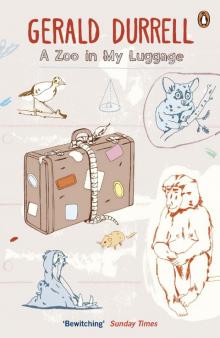 A Zoo in My Luggage
A Zoo in My Luggage The New Noah
The New Noah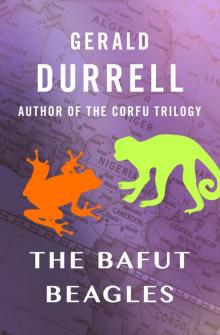 The Bafut Beagles
The Bafut Beagles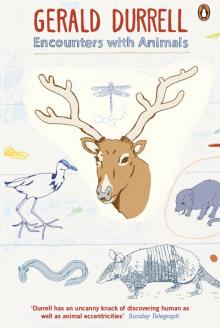 Encounters With Animals
Encounters With Animals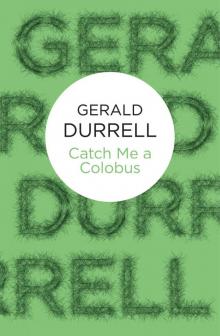 Catch Me a Colobus
Catch Me a Colobus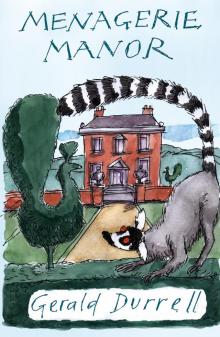 Menagerie Manor
Menagerie Manor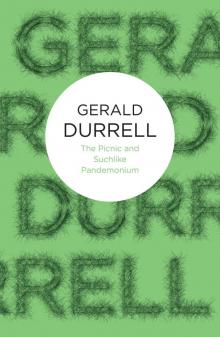 The Picnic and Suchlike Pandemonium
The Picnic and Suchlike Pandemonium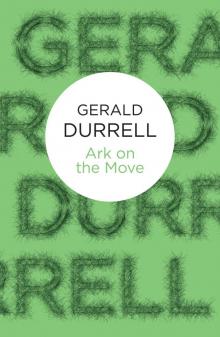 Ark on the Move
Ark on the Move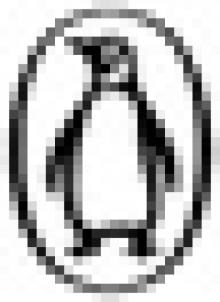 My Family and Other Animals
My Family and Other Animals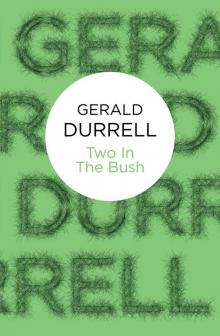 Two in the Bush (Bello)
Two in the Bush (Bello) The Stationary Ark
The Stationary Ark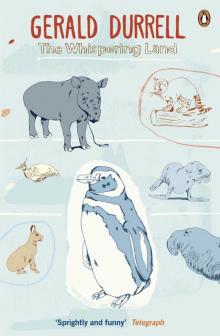 The Whispering Land
The Whispering Land Three Singles to Adventure
Three Singles to Adventure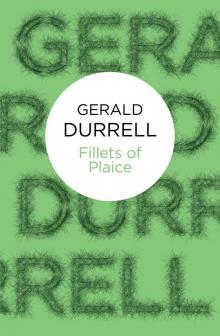 Fillets of Plaice
Fillets of Plaice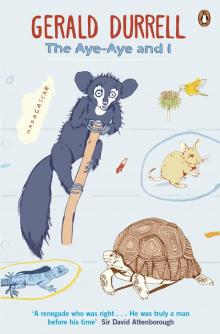 The Aye-Aye and I
The Aye-Aye and I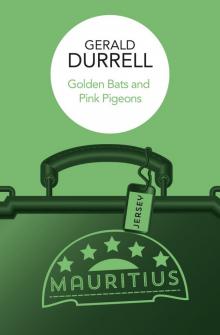 Golden Bats & Pink Pigeons
Golden Bats & Pink Pigeons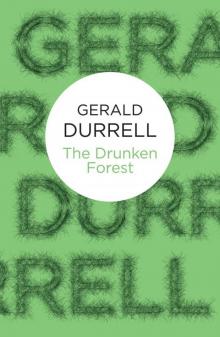 The Drunken Forest
The Drunken Forest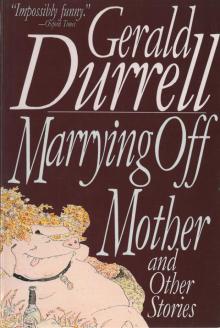 Marrying Off Mother: And Other Stories
Marrying Off Mother: And Other Stories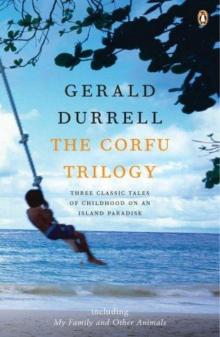 The Corfu Trilogy (the corfu trilogy)
The Corfu Trilogy (the corfu trilogy)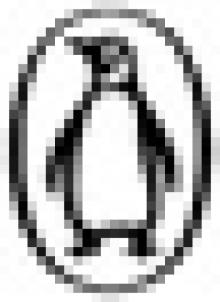 The Corfu Trilogy
The Corfu Trilogy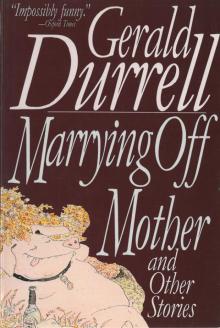 Marrying Off Mother
Marrying Off Mother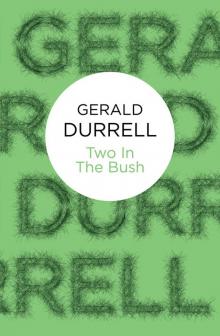 Two in the Bush
Two in the Bush